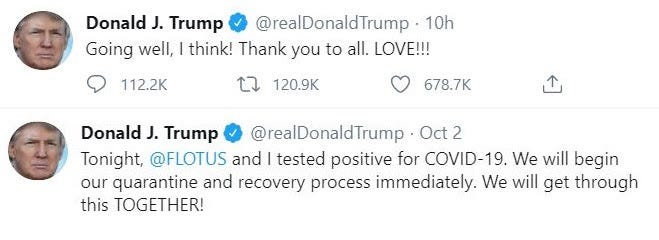Trump's Covid diagnosis, conflict in the South Caucasus, secrecy around Palantir and eating mooncakes
28 September - 4 October 2020
Welcome to October!
BATTLE FOR THE WHITE HOUSE
Donald Trump ended Q3 with a messy debate against Joe Biden and then began Q4 with a positive test result for Covid-19. The turmoil has sent Washington and Wall Street into a spin, and sparked further speculation about polling day on 3 November.
While politicians and pundits were delivering their post-mortem on the chaotic televised showdown, President Trump and his wife Melania suddenly revealed their coronavirus diagnosis late on Thursday. The US leader is currently receiving an experimental anti-viral drug at a prominent military medical centre where he is also working remotely.
Trump's Covid-positive status is shifting attention back to his administration's pandemic response, but much will depend on the severity of his symptoms. At the moment, there's no clarity about the next steps. The second debate (sporting format changes) will probably be postponed, and the already tattered campaign rulebook will need to be revised.
Naturally, Republicans and Democrats hold different views on who's winning the election, however, many agree on who's losing - the average American voter. The unprecedented global crisis, constant bickering on Capitol Hill and social media manipulation provide little opportunity for thorough policy analysis and bipartisan talks.
VIOLENT CONFRONTATION
Hostilities between Armenia and Azerbaijan resumed this past week following clashes in July. Videos from the front line show soldiers in trenches and fierce artillery fire from both sides.
Long simmering tensions between the neighbouring countries have been described as a "time bomb in the Caucasus". The main source of conflict is the territory of Nagorno-Karabakh. Soviet-era borders mean the Armenian-dominated enclave lies completely within Azerbaijan, deepening ethno-religious divisions. A ceasefire was signed in 1994 but a peace accord never emerged.
The historic animosity is complicated by foreign ties. Russia sells arms to Azerbaijan and Armenia - even though it has a military base in the latter. Turkey continues to support "its Azeri brothers". France's Emmanuel Macron and the Guardian say the country has deployed hundreds of Syrian fighters to join Azerbaijani forces - Ankara denies those claims.
On top of that, vital oil and gas pipelines run through the region. All of these factors create a geopolitical headache, as Eurasia Group's Ian Bremmer explains.
SECRETIVE SILICON VALLEY
What is the scariest Big Tech out there? According to industry insiders, it's not Facebook, Google or Huawei but Palantir Technologies.
Although the controversial data-mining company listed on the NYSE on Wednesday, the wider public is still oblivious of its role in intelligence gathering and counter-terrorism.
Bearing the name of the powerful seeing stones in The Lord of the Rings, Palantir's AI-driven tools analyse countless data points and uncover patterns of behaviour in order to single out "bad actors". Think PreCrime in Minority Report.
The software was developed with CIA seed money and primarily helps government institutions with surveillance operations. However, Palantir is expanding and increasingly booking corporate clients, such as Airbus and Ferrari.
Given the highly sensitive nature of its work, human rights groups accuse Palantir of eroding civil liberties. In addition, US congresswoman Alexandria Ocasio-Cortez recently called on the firm to disclosure information to investors about its dealings with foreign security agencies.
If you're curious about the chatter around Palantir, I recommend listening to this episode of Vice's CYBER podcast.
CELEBRATING AUTUMN
The whole of Greater China and the Korean peninsula, as well as several other East Asian communities, commemorated the Harvest Moon on Thursday.
Known as Mid-Autumn Festival in China, Hong Kong and Macau, the holiday is the second most important celebration on the Sino-calendar after the Lunar New Year. Families typically gather for reunion dinners, light paper lanterns and nibble on mooncakes.
What exactly is a mooncake, you might ask. Well living in HK for 3+ years has taught me that these pastries are serious business - and an acquired taste. The traditional variety is filled with lotus seed paste and salted egg yolk. Because they're quite dense (each packs a whopping 790 calories!), mooncakes are usually sliced up and shared among relatives.
Some mooncake brands are fancy enough to be the target of counterfeiters, e.g. in September, HK customs officers "smashed a fake mooncake syndicate".
Western companies - including Haagen-Dazs, Ikea and Starbucks - have jumped on the lucrative mooncake bandwagon, offering their own sweet and savoury twists on the pastry.





